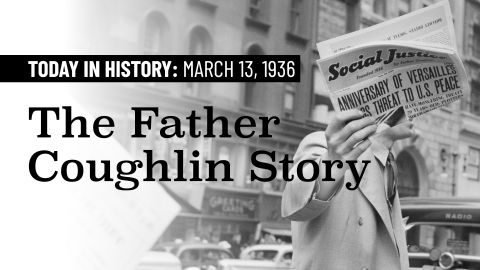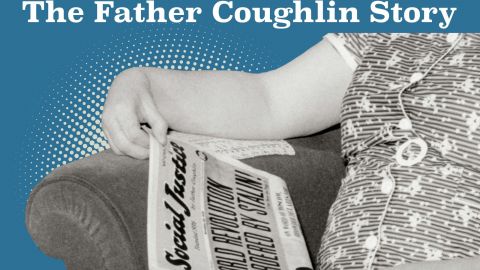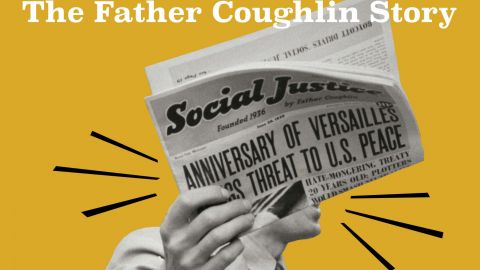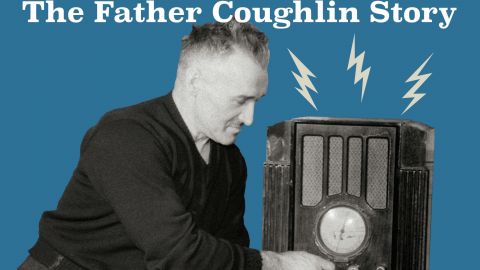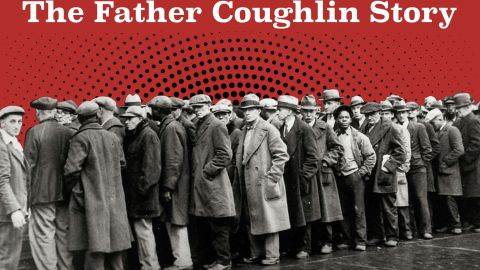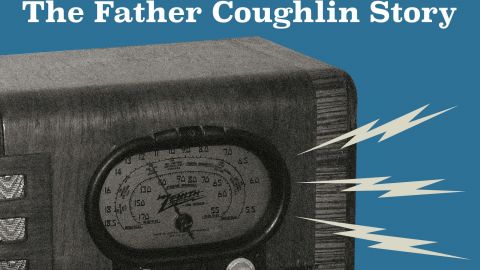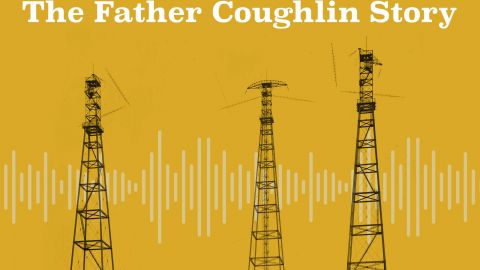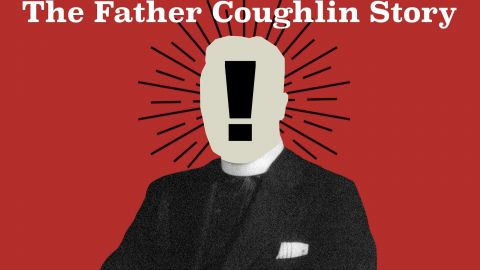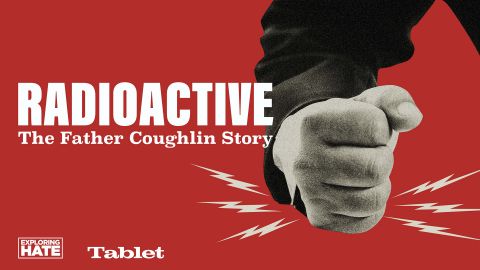The following is a production of Tablet Studios in association with The WNET Group’s reporting initiative, Exploring Hate: Antisemitism, Racism and Extremism, and with support from Maimonides Fund.
Radio announcer: These broadcasts, therefore, support Christianity and Americanism and oppose the advances of irreligion and state supremacy, which masquerades under different foreign isms.
Andrew Lapin: By 1940, Father Charles Coughlin was fighting more wars than even he could imagine winning. Once upon a time, he could walk some sort of line and tell anyone who would listen that he was simply defending core American and Christian values. Now, the Roosevelt administration was passing new anti-sedition broadcasting laws, and Coughlin’s audience was reduced to its most radical elements. More and more groups were denouncing his radio speeches as Fascist propaganda and calling on the Catholic Church to do something about it. The FBI desperately wanted to try him as a seditionist and access agent. Coughlin was paranoid about the government being out to get him, and he was pretty much right, but he still had a few months left on the air before his contract expired and he was going to push the limits like never before.
Charles Coughlin: I am of the opinion that unless the Christian Americans are able to enroll the aid and sympathy of the religious Jews to oppose Communism, as well as Nazism, America eventually will regiment its men, money and munition on the side of the Communists. We recognize the tremendous influence which the sons of Jewry wield in the press, the cinema and the radio. Three cheap sources which control public opinion.
Andrew Lapin: In February of 1940, less than a month after Coughlin defended the attempted violent uprising by the Brooklyn Boys over the air, he submitted a new script for approval to his superior, Archbishop Ed Mooney. Before this point, throughout his entire radio career, Coughlin would largely take care to distinguish what he saw as the good Jews, the ones who believed in God and America and capitalism from the bad Jews, the ones who were secretly Communists and disloyal to the country.
Charles Coughlin: Therefore I plead with the religious Jews of America who entertain sound notions of Semitism to oppose the radicals in their midst who would exploit them, and through them, this country.
Andrew Lapin: In Coughlin’s new script, however, the good Jews and the bad Jews were one and the same. Coughlin writes “Very little of any consequence is taking place in Jewish life in this country without the participation or even the initiative of the Jewish Communists.” Then he tries to convince all “intelligent Jews” to accept the teachings of Jesus Christ, or else they would basically be Communists themselves. In a typical week, Bishop Mooney would have a lot of notes for the script. He’d tell Coughlin to change a word or phrase to make it less offensive and to keep resubmitting drafts throughout the week until the Bishop could sign off on the whole thing. All Coughlin had to do to get on the air was avoid using certain phrases or making too many direct accusations. But this time, the anti-Semitism was too much for Mooney. For the first time, the Bishop rejected an entire script. He ruled that no part of Coughlin’s show that week could reach the airwaves. On February 5th, 1940, Coughlin declared open war on his direct superior. I’m Andrew Lapin and this is Radioactive, an eight part series from Tablet Studios and Exploring Hate about Father Charles Coughlin, the famous radio priest, notorious antisemite, and a man who changed American culture and politics forever. Episode eight: The Ghost of Royal Oak. Coughlin began his scorched earth campaign with a protest episode.
Radio announcer: Ladies and gentlemen, today I have several significant announcements to make.
Andrew Lapin: Coughlin’s announcer told listeners to get a friend to come to the radio to hear what he was about to say.
Radio announcer: It will be of interest to telephone some friend to join this audience.
Andrew Lapin: He even built in a five-minute musical break so that listeners would have time to get as many friends as they could to tune in.
Radio announcer: I shall return to the microphone with the first announcement.
Andrew Lapin: Then the Shrine of the Little Flower choristers kicked in.
Radio announcer: Well, I am instructed to say quote, Father Coughlin will not address you today. No person will address you today over this microphone. I am not authorized to give any explanation, unquote. The second significant announcement: I am instructed to say, quote, pay no heed to idle rumors, which will be circulated this week. Be assured Father Coughlin knows what he is doing. He knows why neither he nor any other person is speaking over this microphone today. Probably events transpiring this week will enlighten you unquote.
Andrew Lapin: All of this was Coughlin’s way of insinuating that he was somehow being censored. And listeners should do their own research to find out why. As the announcer said, be assured, Father Coughlin knows what he is doing. After the protest episode, Mooney and the Cardinals in the Catholic Church he answered to, had had enough. Enough of the grandstanding, the insubordination, the veiled threats of sedition and the not-so-veiled anti-Semitism. They issued an ultimatum to Coughlin: he could give up his radio show and stay in the good graces of the church, or he could continue the show and keep on being a public figure, but without the church’s blessing. That meant he would have to voluntarily defrock himself, giving up the priesthood and the income that came with it. There was a time, not long before, when Coughlin might have chosen his followers over his church. But those days were gone now. The winds were changing, his movement was thinning before his eyes. Without the priesthood, he would soon have nothing left to hang his hat on or to provide him with his livelihood. He agreed to end his radio days at the conclusion of that broadcasting season, and this time he kept his promise. Coughlin ended his radio show in May of 1940. His final surviving episode from April 14th ends with a quotation from St. Paul the Apostle.
Charles Coughlin: May the Lord multiply you and make you abound in charity toward one another and towards all men, as we do also towards you.
Andrew Lapin: And so finally, it happened. Father Coughlin was canceled. But his exit from the limelight was by no means the end of his story.
Charles Lindbergh: I come before you at this time to enter a plea for American independence.
Andrew Lapin: A few months after Father Coughlin ended his radio show, Charles Lindbergh entered the political scene. The aviation hero and fellow Detroit native partnered with former Coughlin ally, Father Edward Lodge Current to start a new movement, the America First Committee. America First had seized the radical isolationist mantle vacated by Coughlin.
Charles Lindbergh: The fact is today that we are divided. We have not confidence in our leaders. We have not confidence in the efficiency or in their judgment. The doctrine that we must enter the wars of Europe in order to defend America will be fatal to our nation if we follow it.
Andrew Lapin: Just like Coughlin, the America First movement attracted many Nazi and Fascist sympathizers. At its peak, it had 800,000 paying members. Curran also continued to encourage the remnants of the Christian Front, the fascist street gangs originally egged on by Coughlin. They were still committing sporadic acts of violence in Boston and New York. Meanwhile, Coughlin continued to publish Social Justice magazine for another two years, even as the climate shifted drastically around him and his readership plummeted. In 1941, Pearl Harbor was attacked and Americans felt the sting of vulnerability for the first time in World War Two. Most of the U.S. rallied behind the war effort after that and wanted nothing more to do with isolationism. The America First committee folded soon after. That year, as part of its effort to round up remaining prominent seditionists, the FBI launched a full scale investigation of Father Coughlin. Social Justice had become, by this point, almost indistinguishable from Nazi propaganda. And J. Edgar Hoover still considered Coughlin a serious threat. The FBI was trying to build a case against Coughlin and targeted one of his closest associates, a man named Louis Ward. Ward was the used car salesman whom Coughlin had turned to early in his radio career to help with marketing and had been with the priest ever since. He became a big organizer in Coughlin’s 1936 presidential campaign and the editorial manager for Social Justice. On the side, Ward had also arranged a secret deal lobbying for the Japanese government. After the Japanese bombed Pearl Harbor, the U.S. government subpoenaed Ward as a grand jury witness in a larger case they wanted to bring against Social Justice. Ward died of a heart attack before he could testify. That didn’t stop the government. Behind the scenes, FDR, a long time target of Father Coughlin’s ire, met with Archbishop Mooney to negotiate an end to the priest’s publishing career. The Post Office, which had once built an entire branch in Royal Oak just to handle Coughlin’s fan mail, now suspended mailing privileges for Social Justice, declaring that it was violating the Espionage Act. 13 members of the magazine’s editorial staff were brought before a grand jury. On paper, the owners of the magazine were Father Coughlin’s parents. On April 15, 1942, Hoover wrote in a memo that he had enough evidence to arrest Coughlin for a clear case of income tax evasion. The case was referred to Henry Morgenthau Jr., FDR’s Jewish Treasury secretary and a frequent target of Coughlin’s conspiracy theories. Morgenthau determined, quote “It would be impolitic for a Jew to inaugurate prosecution against a priest.” In the end, largely due to political perceptions, Coughlin was never charged with any crime. The month after the priests brush with federal consequences, Mooney finally convinced Coughlin to shut down Social Justice, his last remaining outlet to the world beyond the Shrine of the Little Flower. The two men coauthored a statement admitting that Coughlin had defied his direct superior and the Catholic Church by failing to separate the ecclesiastical forum from the civic forum. Coughlin went fully and truly dark. When it was all over, Mooney personally wrote to President Roosevelt, thanking him for not formally pressing charges against the priest. The president had shown, Mooney said, true Christian charity. FDR replied, “May I say that I think both you and I can well have sympathy with our mutual problems. In this case, I really feel that both of us have shown true Christian charity.” Mooney will later call the whole affair, quote “This sorry chapter in the life of a misguided priest.” Four years later, the Catholic Church promoted Mooney to Cardinal.
Don’t Be a Sucker: I want to give you the truth, folks, the truth about America. I know you’ve got a lot of questions. You want to know why you’re not getting the breaks you deserve. My friends, I’m just an average American, but I’m an American American. And some of the things I see in this country of ours make my blood boil. I see people with foreign accents making all the money. I see Negroes holding jobs that belong to me and you. I ask you if allow this thing to go on, what’s going to become of us real Americans?
Andrew Lapin: In 1943, the U.S. War Department produced a short film called “Don’t Be a Sucker,” designed to be shown to Americans everywhere.
Don’t Be a Sucker: Excuse me, young man, but are you actually going to read that stuff? Sure. Why not, you heard what he said, didn’t you? Yes, I heard. Do you believe in that kind of talk? It all pretty good sense to me. I was born in Hungary, but now I am an American citizen and I have seen what this kind of talk can do. I saw it in Berlin.
Andrew Lapin: The hero of the movie initially becomes sucked in by a demagogue preaching on a street corner. But eventually he comes to realize that demagogery is bad and that fighting such forces in society is the true American way. By releasing a transparently anti-fascist propaganda video like this in 1943, it was clear what the War Department was trying to do: convince the American public to stop listening to figures like Father Coughlin. Of course, by that point, Coughlin himself had essentially vanished from the national stage. His rise and fall over the past 16 years was now complete. By and large, the only Americans who are still listening to Coughlin on a regular basis were his parishioners at the Shrine of the Little Flower in Royal Oak, Michigan. It was only once Father Coughlin was safely out of the spotlight that the U.S. government felt they could take such a public stance against his activities.
Todd Gitlin: There is no mass politics without media because mass politics requires mobilization.
Andrew Lapin: Todd Gitlin is a professor of mass media studies at Columbia University. He says that in the decades following Father Coughlin’s fall from grace, the media landscape, including radio, television and social media, has continually proven to be a powerful tool for populists.
Todd Gitlin: Using their voices as means for rallying their people, and so, in a sense, giving their people a voice. So I am your voice, only I can fix it. There’s something inviting about radio. There was a kind of comfort in having somebody ranting in your ear and confirming your prejudices. We’re with this phenomenon to stay. They can be perhaps contained, but there will be, for the foreseeable future, a critical mass of people around the world who adhere to untruth and who have their reasons for adhering to untruths, have their support systems, have their political parties, have their big bucks, supporters make use of their reach. I don’t see how the, you know, spray something at them and make them run away. They’re there. The question is how can their influence be contained?
Andrew Lapin: The U.S. government made some attempts over the decades to squash the influence of figures like Father Coughlin. In 1949, the FCC passed the Fairness Doctrine, designed to control the scope of debate in the public square. The Fairness Doctrine proclaimed that any discussion of controversial topics in a broadcast medium had to give equal time to balanced opposing viewpoints. The law itself was immediately controversial. It provided little guidance on what qualified as a viewpoint worth equal debate time. Eventually, in 1987, the FCC under President Ronald Reagan abolished the fairness doctrine, saying it had had a chilling effect on free speech. This paved the way for the phenomenal success of right wing talk radio and cable news.
Rush Limbaugh: Al Sharpton goes out the front door. Yes, I spoke a little Negro dialect there. I can do that when I when I want to.
Ben Shapiro: There was a national apology for slavery. It was called the Civil War, where 700000 Americans died.
Tucker Carlson: White supremacy, that’s the problem. This is a hoax.
Todd Gitlin: It was quickly discovered in the late 80s and early 90s that you could make piles of money with a Rush Limbaugh or his imitators. What developed was a sort of cult of personality. They were on the air for hours on end, and they were, they became ensconced in the culture.
Rush Limbaugh: More stuff is coming out now. Also how much the Bush administration ignored the intelligence. It was almost like they ignored it because they wanted it to happen.
Joy Reid: Republicans aren’t running an election. They’re waging an all out war for power that increasingly is based on and steeped in the Trump cult.
Andrew Lapin: With the rise of the internet, the federal government couldn’t keep up with any meaningful regulation. Companies like Facebook, Twitter and Google, which owns YouTube, have raked in unprecedented advertising revenue by segmenting their users into information bubbles fueled by algorithms designed to increase engagement on their platforms — engagement driven mostly by outrage inducing headlines and completely fabricated stories. In the 1930s, millions of people gathered around their radios each Sunday to receive Father Coughlin’s worldview. These days, there are many voices, many platforms and many different gospels. The media may be different, but the messages are still getting through.
George Wallace: And I say segregation now, segregation tomorrow and segregation forever.
Louis Farrakhan: And I’m here to separate the good Jews from the satanic Jews. Yes, yes, yes.
Pat Roberts: There’s never been a civilization ever in history that has embraced homosexuality and has survived.
Alex Jones: I don’t like them putting chemicals in the water that turn the frigging frog gay.
Donald Trump: I alone can fix it. They’re bringing drugs. They’re bringing crime. They’re rapists. We’re going to build a wall. It’s going to be built. Total and complete shutdown of Muslims entering the United States until our country’s representatives can figure out what the hell is going on. From this day forward, a new vision will govern our land. From this day forward, it’s going to be only America first, America first. Together, we will make America strong again. We will make America wealthy again. We will make America proud again. We will make America safe again. And yes, together we will make America great again.
Michael Flynn: [00:22:21] So if we are going to have One Nation under God, which we must, we have to have one religion, one one one nation under God and one religion under God, right?
Louis Farrakhan: How precisely is diversity our strength? Mexico has helped its citizens to break our federal laws. It’s done that for years. That’s what it looks like when a hostile foreign power interferes in your democracy. We’re being invaded. It’s going to overwhelm our country and change it completely and forever. And our viewers should know that.
Andrew Lapin: Father Coughlin didn’t live to see the full effect of the media maelstrom he unleashed. Quietly, he continued to serve as pastor of the shrine for twenty four more years. From time to time, some concerned citizen in Royal Oak would call in a tip to the FBI about something sinister they thought was going on at the shrine, and the Feds would add it to their ever-growing file on Coughlin. Once or twice, they sent an undercover agent to attend services at the parish to see if Coughlin sermons had retained their radical qualities. For the rest of his life, none of Coughlin’s activities ever again rose to the level of a national security threat. In his sudden solitude, the radio priest had earned a new nickname for himself: the Ghost of Royal Oak. He still published the occasional book, discourses on how he felt the church was getting too liberal, but mostly he concerned himself with everyday parish activities. He built up the private day school at the shrine and would often lecture the students himself.
Nan Conlin: We had two people then who ran the school. We had our regular principal and we had Father Coughlin. It was kind of like getting Glenn Beck or somebody dropped off as your principal.
Andrew Lapin: Nan Conlin was a student at Shrine High School in the late 40s and early 50s, when Father Coughlin was still an active presence. She remembers how the priest would address his students in the sanctuary for morning mass, sometimes for hours at a time, about nothing at all.
Nan Conlin: He might keep us for two and a half hours. He liked to talk. It was a strange place to go to school. I didn’t like him. I didn’t like being there. One time, I think we were sitting there while he lectured just on how we should corner the supermarket and he would read off grades or make comments and he gave away the report cards, and sometimes he had people in tears over that. We had one student, a young man who came up to get his grades and Father Coughlin said, Your parents haven’t paid your tuition yet. Just in front of the entire school. And he turned to his right, walked up double doors of the gymnasium and out of the school and never came back.
Andrew Lapin: The messenger of God, who had once commanded a nation, challenged a president and convinced millions of people he was the messiah, was now just a sad old man picking fights with teenagers.
Nan Conlin: There was a girl in our class who became pregnant and he called the entire school together to talk about this, and it was the last thing she needed. He kept saying “the fornicating on campus has to cease,” but that was really terrible for her and she left school. She didn’t come back.
Andrew Lapin: Father Coughlin formally retired from the Shrine in 1966, fifty years after the start of his pastoral career. To commemorate the occasion, Shrine threw him a golden jubilee and offered commemorative gold coins emblazoned with the priest’s face. Today, you can find those gold coins for $20 on eBay. Father Coughlin appeared on the radio one last time in 1978 as a guest on a call-in show. The host, Howard Miller was a fan of his and told Coughlin that America needed his guidance now more than ever
Howard Miller: Father, bring us up to the present. You were a prophetic man, 30, 40 years ago. Be a man of prophecy, again.
Charles Coughlin: It’s very easy to do. This is not prophecy. This is simply putting facts of history, and psychology, social psychology, together.
Andrew Lapin: Coughlin used the opportunity to deny that he was ever in league with Hitler and to remind his listeners that he and he alone had foreseen the dangers of Communism before anyone else. Since I first began this project four years ago, I’ve heard all kinds of stories from people who want to tell me about their associations with Father Coughlin. There were the brothers who shared stories about their uncle, a congressman from Cleveland, who read policy suggestions from Coughlin on the House floor. There was the man who claimed to be a distant relative of Coughlin from his birthplace in Hamilton, Ontario, who refused to give his name but wanted me to know that everyone in the priest’s extended family is ashamed of his actions. There was the Jewish thoracic surgeon, since deceased, who, alongside a black resident, once operated on Coughlin, with the Father insisting just before he went under that he wasn’t actually anti-Semitic. At some point, all of those stories ended with the radio priest’s death in 1979 of heart failure. Father Coughlin was 88. His final resting place is a cemetery in nearby Southfield with a simple tombstone, one that hardly betrays the ego of the grave’s occupant. In 1992, urged by a local interfaith group, Shrine clergy held a ceremony outside their parish to apologize for Father Coughlin’s anti-Semitism. The pastor at the time, Alex Brunett, told the crowd “I would change history if I could.” Many Jewish groups stayed away from the event, not ready to forgive the actions of the past. One protester stood across the street with a sign reading “Father Coughlin was right on target.” Coughlin’s noxious style is emulated by many today online and on the airwaves to support all kinds of belief systems. His speeches and Social Justice articles circulated for decades as neo-Nazi recruitment tools. A few Americans continue to recreate his hateful anti-Semitism. In 2018, a man walked into a synagogue in Pittsburgh and murdered 11 Jews mid-prayer. He believed in a conspiracy theory amplified online by white supremacist media that the Jews were secretly orchestrating caravans of Central American immigrants to take over the country. After this horrific event, I received an email from Monsignor Robert McClory, the pastor and rector of the Shrine of the Little Flower, whom I’d first connected with a few months earlier to discuss Father Coughlin a conversation we heard in episode one. McClory now told me that the news of the Pittsburgh murders had shaken him. He attended a local interfaith Shabbat of solidarity for the victims. Mostly, he wanted me to know that his parishioners were praying for their Jewish brothers and sisters. The Monsignor also sent me something: an interview he had done after the shooting with the Detroit radio station. And so I listened — to the priest of the Shrine of the Little Flower on the radio talking about the Jews.
Robert McClory: We are all children of God, and when one member suffers, we all suffer. And so during this time of pain and tragedy, it’s important to stand in solidarity so that we can give witness to God’s love for all. And so we believe in a free exchange of ideas, but not this labeling of each other and this form of hatred that was expressed so horribly in Pittsburgh last Saturday. I do think that we have a particular obligation at the Shrine of Little Flower to respond quickly and decisively when there’s any form of anti-Semitism. And so we included in our prayers of the faithful, at our services, our masses over the weekend immediately when we found out about this. We added it to our list of prayers.
Andrew Lapin: One year later, Pope Francis promoted Monsignor McClory to become Bishop of Gary, Indiana. McCloy’s final sermon to his flock at the Shrine of the Little Flower on New Year’s Eve 2019 was about the evils of antisemitism and about Father Coughlin.
Robert McClory: Sadly, a part of our history, our founding pastor, Father Coughlin, issued words from the airwaves that targeted and hurt many of our Jewish brothers and sisters. Do I think that we suffer and experience that today? No. But do I think that we still live in the legacy and have to acknowledge the source of pain for our Jewish brothers and sisters? Yes. Prayer is power. Pray for peace. There’s lots that we can do. We’re not bound by our history, personally, corporately, but we are obliged by our history, personally and corporately, to be channels of peace.
Andrew Lapin: This, too, is Father Coughlin’s legacy: the hate, but also the good people who oppose it. The darkness, but also the light. There are still people who hear in the distant echoes of the radio priest’s voice, an invitation to climb on top of the same soapbox and shout the same vile slogans. But then, as now, there are also people who see the dangers of division and who believe that America’s promise is greater than anything sold by even the most skillful demagogue. These days, when I drive by the Shrine of the Little Flower and gaze up at the Charity Tower, I think about my thriving Detroit Jewish community. I see a monument to a force that my people and good Americans everywhere found a way to overcome. And I don’t feel so afraid. Radioactive is hosted by me, Andrew Lapin, and is a production of Tablet Studios in association with The WNET Group’s reporting initiative Exploring Hate: Antisemitism, Racism, and Extremism, and with support from Maimonides Fund. The show was produced and edited by Josh Kross and Robert Scaramuccia with help from Quinn Waller. Our managing producer is Sara Fredman Aeder. Our executive producers are Liel Leibovitz and Stephanie Butnick. Our theme music is from the Ghostwriter and was composed by Alexandre Desplat. All speeches and material of Father Coughlin are authentic to the source, as well as music and other audio from his radio program. This episode was recorded at Michigan Radio, Ann Arbor’s NPR station. Our recording engineer at Michigan Radio is Peg Watson. Special thanks this episode to the Conlin Family, the Jewish Historical Society of Michigan, the Askwith Media Library at the University of Michigan and the Archdiocese of Detroit. Thanks as well to Glenn and Natalie Lapin, Stephen and Michelle Kay and Anna McDowell. The show wouldn’t have happened without your support. Please go rate and review us wherever you listen to podcasts. And if you enjoyed the series, tell a friend. For more information about the show and all of Tablet’s podcasts, please visit tabletmag.com/podcasts. And thank you for listening.
Major funding for Exploring Hate has been provided by: The Sylvia A. and Simon B. Poyta Programming Endowment to Fight Antisemitism, Sue and Edgar Wachenheim III, Charlotte and David Ackert, The Peter G. Peterson and Joan Ganz Cooney Fund, and Patti Askwith Kenner. For a complete list of funders, please visit pbs.org/exploringhate.

